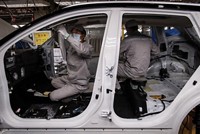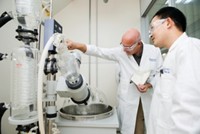Advertisement
Grab your lab coat. Let's get started
Welcome!
Welcome!
Create an account below to get 6 C&EN articles per month, receive newsletters and more - all free.
It seems this is your first time logging in online. Please enter the following information to continue.
As an ACS member you automatically get access to this site. All we need is few more details to create your reading experience.
Not you? Sign in with a different account.
Not you? Sign in with a different account.
ERROR 1
ERROR 1
ERROR 2
ERROR 2
ERROR 2
ERROR 2
ERROR 2
Password and Confirm password must match.
If you have an ACS member number, please enter it here so we can link this account to your membership. (optional)
ERROR 2
ACS values your privacy. By submitting your information, you are gaining access to C&EN and subscribing to our weekly newsletter. We use the information you provide to make your reading experience better, and we will never sell your data to third party members.
Outsourcing
Covid-19
China’s contract research firms rebound after coronavirus
Chemistry CROs are back in business as rest of world starts to lock down
by Hepeng Jia, special to C&EN
March 25, 2020
| A version of this story appeared in
Volume 98, Issue 12

China’s nationwide lockdown in February and early March to curb the spread of COVID-19 caused clients of Chinese pharmaceutical contract research organizations (CROs) to fear for the continuity of projects they had outsourced. Now, as the coronavirus spreads everywhere else on the globe, China’s seemingly successful measures to contain it may help those same CROs secure steady growth.
Thanks to China’s deep chemistry resources, the country’s CROs have seen robust growth in recent years. Shortly before the COVID-19 outbreak in late January, Chinese media widely cited an estimate by the consulting firm Frost & Sullivan that CRO sales in China had increased from $2.1 billion in 2014 to $5.9 billion in 2018 and may grow to $21.4 billion by 2023.
Support nonprofit science journalism
C&EN has made this story and all of its coverage of the coronavirus epidemic freely available during the outbreak to keep the public informed. To support us:
Donate Join Subscribe
On March 23, China’s largest CRO, WuXi AppTec, announced that its 2019 revenues grew by more than a third to $1.8 billion and that it signed up 1,200 new customers last year. Another leading player, ChemPartner, just opened a 24,000 m2 laboratory in Shanghai’s Zhangjiang Hi-Tech Park that houses approximately 700 employees.
Continued growth seemed threatened last month when China’s national lockdown dramatically cut work by local CROs, causing Western clients to reconsider their heavy reliance on them. Yet most CROs are already back up to full speed.
WuXi reports that, by March 24, 96% of its employees had returned to work at its various sites, including an R&D center in Wuhan, where the pandemic began. CEO Ge Li said in a news release that he expects COVID-19 to delay projects at the company by only 2 to 3 weeks. Meanwhile, lockdowns are spreading across Europe and North America.
“Now, relying on [Chinese] CROs has shown its advantages,” says Jack Lu, president of the Shanghai–based CRO and drug intermediate supplier AQ Biopharma. “The normal operation of Chinese CROs can help many US projects impacted by the epidemic continue.”
The earlier stumble by Chinese CROs may lead some foreign clients to consider geographically diversifying their outsourcing deals, Lu acknowledges, but growing demand from Chinese biotech and drug companies should offset any losses. He says the domestic share of his company’s business has shifted from 20% several years ago to 80% today.
The COVID-19 pandemic may add to this trend. Since the outbreak, China’s Ministry of Science and Technology and its National Health Commission have issued dozens of grants to support coronavirus treatment and vaccine projects, mostly done by academic researchers or small innovative drug developers. “Without sufficient research facilities, they can only rely on CROs to fulfill their projects,” Lu says.





Join the conversation
Contact the reporter
Submit a Letter to the Editor for publication
Engage with us on Twitter